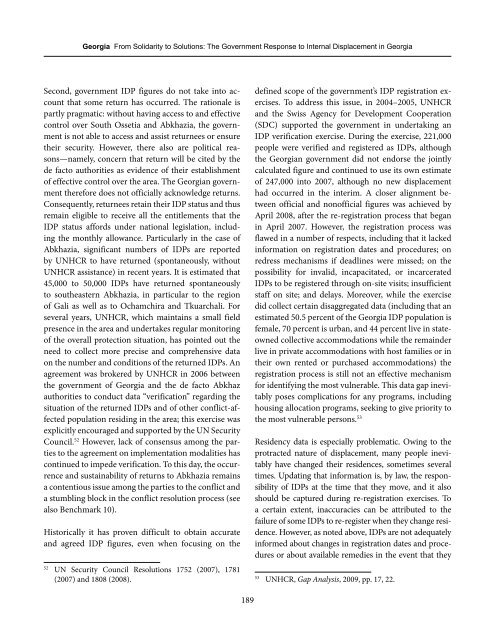From Responsibility to Response: Assessing National - Brookings
From Responsibility to Response: Assessing National - Brookings
From Responsibility to Response: Assessing National - Brookings
You also want an ePaper? Increase the reach of your titles
YUMPU automatically turns print PDFs into web optimized ePapers that Google loves.
Georgia <strong>From</strong> Solidarity <strong>to</strong> Solutions: The Government <strong>Response</strong> <strong>to</strong> Internal Displacement in Georgia<br />
Second, government IDP figures do not take in<strong>to</strong> account<br />
that some return has occurred. The rationale is<br />
partly pragmatic: without having access <strong>to</strong> and effective<br />
control over South Ossetia and Abkhazia, the government<br />
is not able <strong>to</strong> access and assist returnees or ensure<br />
their security. However, there also are political reasons—namely,<br />
concern that return will be cited by the<br />
de fac<strong>to</strong> authorities as evidence of their establishment<br />
of effective control over the area. The Georgian government<br />
therefore does not officially acknowledge returns.<br />
Consequently, returnees retain their IDP status and thus<br />
remain eligible <strong>to</strong> receive all the entitlements that the<br />
IDP status affords under national legislation, including<br />
the monthly allowance. Particularly in the case of<br />
Abkhazia, significant numbers of IDPs are reported<br />
by UNHCR <strong>to</strong> have returned (spontaneously, without<br />
UNHCR assistance) in recent years. It is estimated that<br />
45,000 <strong>to</strong> 50,000 IDPs have returned spontaneously<br />
<strong>to</strong> southeastern Abkhazia, in particular <strong>to</strong> the region<br />
of Gali as well as <strong>to</strong> Ochamchira and Tkuarchali. For<br />
several years, UNHCR, which maintains a small field<br />
presence in the area and undertakes regular moni<strong>to</strong>ring<br />
of the overall protection situation, has pointed out the<br />
need <strong>to</strong> collect more precise and comprehensive data<br />
on the number and conditions of the returned IDPs. An<br />
agreement was brokered by UNHCR in 2006 between<br />
the government of Georgia and the de fac<strong>to</strong> Abkhaz<br />
authorities <strong>to</strong> conduct data “verification” regarding the<br />
situation of the returned IDPs and of other conflict-affected<br />
population residing in the area; this exercise was<br />
explicitly encouraged and supported by the UN Security<br />
Council. 52 However, lack of consensus among the parties<br />
<strong>to</strong> the agreement on implementation modalities has<br />
continued <strong>to</strong> impede verification. To this day, the occurrence<br />
and sustainability of returns <strong>to</strong> Abkhazia remains<br />
a contentious issue among the parties <strong>to</strong> the conflict and<br />
a stumbling block in the conflict resolution process (see<br />
also Benchmark 10).<br />
His<strong>to</strong>rically it has proven difficult <strong>to</strong> obtain accurate<br />
and agreed IDP figures, even when focusing on the<br />
52 UN Security Council Resolutions 1752 (2007), 1781<br />
(2007) and 1808 (2008).<br />
189<br />
defined scope of the government’s IDP registration exercises.<br />
To address this issue, in 2004–2005, UNHCR<br />
and the Swiss Agency for Development Cooperation<br />
(SDC) supported the government in undertaking an<br />
IDP verification exercise. During the exercise, 221,000<br />
people were verified and registered as IDPs, although<br />
the Georgian government did not endorse the jointly<br />
calculated figure and continued <strong>to</strong> use its own estimate<br />
of 247,000 in<strong>to</strong> 2007, although no new displacement<br />
had occurred in the interim. A closer alignment between<br />
official and nonofficial figures was achieved by<br />
April 2008, after the re-registration process that began<br />
in April 2007. However, the registration process was<br />
flawed in a number of respects, including that it lacked<br />
information on registration dates and procedures; on<br />
redress mechanisms if deadlines were missed; on the<br />
possibility for invalid, incapacitated, or incarcerated<br />
IDPs <strong>to</strong> be registered through on-site visits; insufficient<br />
staff on site; and delays. Moreover, while the exercise<br />
did collect certain disaggregated data (including that an<br />
estimated 50.5 percent of the Georgia IDP population is<br />
female, 70 percent is urban, and 44 percent live in stateowned<br />
collective accommodations while the remainder<br />
live in private accommodations with host families or in<br />
their own rented or purchased accommodations) the<br />
registration process is still not an effective mechanism<br />
for identifying the most vulnerable. This data gap inevitably<br />
poses complications for any programs, including<br />
housing allocation programs, seeking <strong>to</strong> give priority <strong>to</strong><br />
the most vulnerable persons. 53<br />
Residency data is especially problematic. Owing <strong>to</strong> the<br />
protracted nature of displacement, many people inevitably<br />
have changed their residences, sometimes several<br />
times. Updating that information is, by law, the responsibility<br />
of IDPs at the time that they move, and it also<br />
should be captured during re-registration exercises. To<br />
a certain extent, inaccuracies can be attributed <strong>to</strong> the<br />
failure of some IDPs <strong>to</strong> re-register when they change residence.<br />
However, as noted above, IDPs are not adequately<br />
informed about changes in registration dates and procedures<br />
or about available remedies in the event that they<br />
53 UNHCR, Gap Analysis, 2009, pp. 17, 22.

















